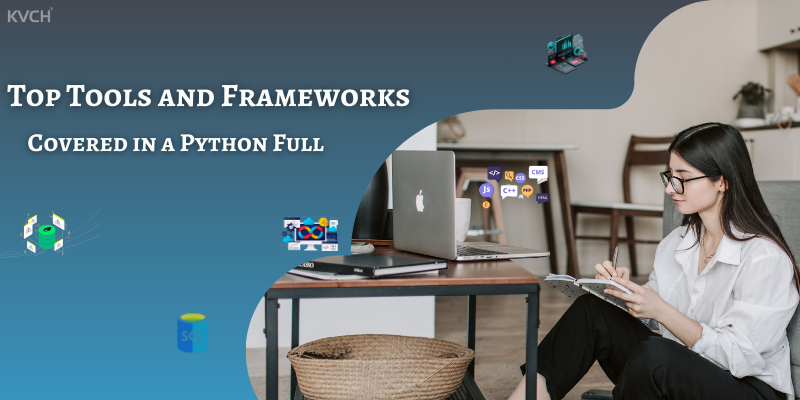Top Tools and Frameworks Covered in a Python Full Stack Course
- Rohit singh
- 1 day ago
- 6 min read

The demand for skilled full stack developers continues to soar as businesses increasingly rely on robust, scalable, and dynamic web applications. Among the myriad of programming languages, Python stands out for its versatility, readability, and extensive ecosystem, making it a top choice for aspiring full stack developers. A Python Full Stack Developer Course Syllabus equips learners with the skills to build end-to-end web applications, covering both front-end and back-end development. Whether you're enrolling in a Python Training Institute in Noida or pursuing an online course, understanding the tools and frameworks included in a Python Full Stack Developer Syllabus is crucial for mastering this in-demand skill set.
In this article, we’ll explore the top tools and frameworks typically covered in a comprehensive Python full stack developer course, offering insights into how they empower developers to create modern, efficient, and user-friendly applications. This guide is designed to provide valuable information for beginners and professionals alike, helping you navigate the exciting world of full stack development with Python.
What is a Python Full Stack Developer Course?
A Python Full Stack Developer Course Syllabus is a structured learning path that covers the entire spectrum of web development using Python. It includes front-end technologies for creating user interfaces, back-end frameworks for server-side logic, and databases for data management. Additionally, it emphasizes tools for version control, testing, deployment, and more. By mastering these components, students can build fully functional web applications from scratch.
Enrolling in a Python Training Institute in Noida or a reputable online program ensures you gain hands-on experience with industry-standard tools and frameworks. Let’s dive into the key components of a Python Full Stack Developer Syllabus, focusing on the tools and frameworks that form the backbone of full stack development.
Front-End Tools and Frameworks in a Python Full Stack Course
The front-end is the user-facing part of a web application, responsible for the look, feel, and interactivity. While Python is primarily a back-end language, a full stack course integrates front-end technologies to ensure developers can create seamless user experiences. Here are the top front-end tools and frameworks covered:
HTML, CSS, and JavaScript
These are the foundational technologies for front-end development. A Python Full Stack Developer Syllabus typically starts with:
HTML: For structuring web content.
CSS: For styling and responsive design, often including frameworks like Bootstrap or Tailwind CSS for rapid development.
JavaScript: For adding interactivity, with libraries like jQuery for DOM manipulation or React.js for building dynamic user interfaces.
These technologies ensure developers can create visually appealing and responsive web pages, a critical skill taught in any Python Training Institute in Noida.
React.js
React.js, a popular JavaScript library, is often included in advanced full stack courses. It allows developers to build reusable UI components and manage state efficiently. React’s component-based architecture complements Python’s back-end capabilities, enabling seamless integration in full stack projects.
Bootstrap or Tailwind CSS
To streamline front-end development, frameworks like Bootstrap or Tailwind CSS are taught. These CSS frameworks provide pre-designed components and utility classes, reducing the time needed to create responsive, mobile-friendly designs.
Back-End Frameworks in a Python Full Stack Course
The back-end handles server-side logic, database interactions, and application functionality. Python’s robust ecosystem offers powerful frameworks that simplify back-end development. Here are the top back-end frameworks covered in a Python Full Stack Developer Course Syllabus:
Django
Django is a high-level Python web framework that emphasizes rapid development and clean design. It follows the "Don’t Repeat Yourself" (DRY) principle and includes features like:
An ORM (Object-Relational Mapping) for database interactions.
Built-in authentication and authorization systems.
An admin panel for managing application data.
Django is a cornerstone of most Python Full Stack Developer Syllabi due to its scalability and extensive documentation, making it ideal for building complex applications like e-commerce platforms or content management systems.
Flask
Flask is a lightweight, micro-framework that offers flexibility for developers who prefer minimal setup. Unlike Django, Flask provides the essentials, allowing developers to choose their tools for tasks like database integration or authentication. It’s perfect for smaller projects or APIs and is often taught alongside Django to provide a balanced perspective.
FastAPI
FastAPI is a modern, high-performance framework for building APIs with Python. Known for its speed and asynchronous capabilities, FastAPI is gaining traction in full stack courses. It’s particularly valuable for creating RESTful APIs that integrate with front-end frameworks like React or Angular.
Database Management in a Python Full Stack Course
Databases are critical for storing and managing application data. A Python Full Stack Developer Syllabus typically covers both SQL and NoSQL databases, along with tools to interact with them.
PostgreSQL
PostgreSQL is a powerful, open-source relational database system. Courses teach how to use PostgreSQL with Python via libraries like psycopg2 or ORMs like Django’s built-in ORM or SQLAlchemy. Students learn to design database schemas, write queries, and manage data efficiently.
MongoDB
MongoDB, a NoSQL database, is often included to teach handling unstructured data. Its document-based structure is ideal for applications requiring flexibility, such as real-time analytics or content-heavy platforms. Libraries like PyMongo are used to integrate MongoDB with Python.
SQLAlchemy
SQLAlchemy is a Python SQL toolkit and ORM that simplifies database interactions. It’s commonly taught in full stack courses to provide a flexible way to work with relational databases like PostgreSQL or MySQL.
Version Control and Collaboration Tools
Effective collaboration and code management are essential for full stack developers. A Python Training Institute in Noida emphasizes tools that streamline teamwork and project management.
Git and GitHub
Git is the industry-standard version control system, and GitHub is a platform for hosting and collaborating on code. Students learn to:
Create repositories and manage branches.
Commit, push, and pull changes.
Resolve merge conflicts and collaborate with teams.
These skills are critical for working in professional development environments.
Testing and Debugging Tools
Quality assurance is a key aspect of full stack development. A Python Full Stack Developer Syllabus includes tools for testing and debugging to ensure robust applications.
PyTest
PyTest is a popular testing framework for Python. It’s used to write unit tests, integration tests, and functional tests, ensuring that both front-end and back-end components work as expected.
Selenium
For front-end testing, Selenium is often taught to automate browser interactions. It’s useful for testing user interfaces and ensuring cross-browser compatibility.
Deployment and DevOps Tools
Deploying applications to production is a critical skill for full stack developers. Courses cover tools to streamline deployment and maintain applications.
Docker
Docker is used to containerize applications, ensuring consistency across development, testing, and production environments. Students learn to create Docker images for Python applications and deploy them efficiently.
AWS or Heroku
Cloud platforms like AWS or Heroku are often introduced for deploying web applications. These platforms teach students how to scale applications, manage servers, and integrate services like load balancers or databases.
Gunicorn and Nginx
Gunicorn is a WSGI server for running Python web applications, while Nginx is a web server used as a reverse proxy. Together, they ensure applications are served efficiently in production environments.
Additional Tools and Libraries
A comprehensive Python Full Stack Developer Course Syllabus also covers supplementary tools that enhance development workflows.
REST APIs and Postman
Understanding REST APIs is essential for connecting front-end and back-end systems. Tools like Postman are taught to test APIs, ensuring smooth communication between application layers.
Virtualenv
Virtualenv is used to create isolated Python environments, allowing developers to manage dependencies for different projects without conflicts.
Jupyter Notebooks
For prototyping and data analysis, Jupyter Notebooks are often included. They’re particularly useful for back-end developers working on data-driven applications.
Why Choose a Python Training Institute in Noida?
Noida has emerged as a hub for tech education, with numerous institutes offering comprehensive full stack development courses. A Python Training Institute in Noida provides:
Expert Instructors: Learn from industry professionals with real-world experience.
Hands-On Projects: Build portfolio-worthy projects to showcase your skills.
Career Support: Many institutes offer placement assistance, connecting students with top tech companies.
By enrolling in a Python Full Stack Developer Course Syllabus at a reputed institute, you gain access to structured learning, mentorship, and the latest industry tools.
Conclusion
A Python Full Stack Developer Syllabus is designed to transform beginners into proficient developers capable of building end-to-end web applications. From front-end tools like HTML, CSS, and React to back-end frameworks like Django and FastAPI, the syllabus covers a wide range of technologies.
Add to that databases like PostgreSQL and MongoDB, version control with Git, and deployment tools like Docker and AWS, and you have a comprehensive skill set that’s highly sought after in the tech industry.
Whether you’re joining a Python Training Institute in Noida or opting for an online course, mastering these tools and frameworks will set you on the path to becoming a versatile full stack developer. Start your journey today, and unlock the potential to create innovative, scalable, and user-friendly web applications with Python.



Comments